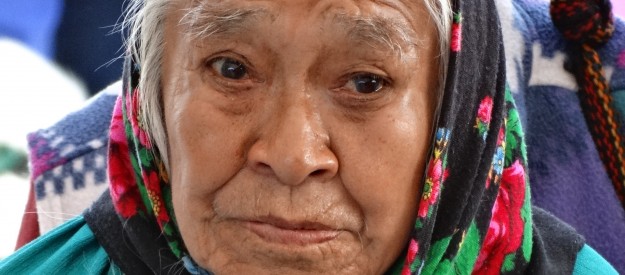"We are losing our attitude of wonder, of contemplation, of listening to creation and thus we no longer manage to interpret within it what Benedict XVI calls 'the rhythm of the love-story between God and man.'"
+ Pope Francis
Bonn, Alaska, and the Gwich’in

Many Americans probably haven’t heard of the Gwich’in people. Most of us may not know how these natives live off vast lands in Alaska—and how they’ve done so for centuries. We may not know the Gwich’in language, history, art, customs—and their reliance on the ecosystems of the Arctic National Wildlife Refuge, and how that land may soon be opened to fossil fuel extraction.
Real-world peoples like the Gwich’in remind us that what’s happening a half a world away at international climate talks in Bonn, Germany, as well as what's happening in Washington D.C., matters more than we may know. It’s realities like the Gwich’in desire to protect their lands that remind us what it means to care for the least among us—and for our common home.
The name Gwich’in means something akin to “one who dwells.” They are people of the land—a trait that modern communities would do well to imitate.
And now their land is threatened by our nation’s need for oil—for energy independence, some say. For security and economic development. And because of that, the Gwich’in are in a fight for their life.
I first heard the cries of the Gwich’in through a regular reader of Catholic Ecology, Stephen Arturo Greenlaw, a passionate young man whose heart is breaking for these people.
“Our concern for climate change is tied with Indigenous rights,” he wrote to me the other day. “How can we confront climate change by opening up the Arctic Refuge for oil development? The implications of opening this area for extraction not only impacts the climate but the native peoples who subsist on the Porcupine Caribou herd.”
Greenlaw, a senior fisheries major at the University of Alaska Fairbanks, has been for some time on the front lines of the battle against climate change. He reminds us that climate change and its causes come with implications that relate directly to the divine command to love one’s neighbor.
“Pope Francis in Laudato Si’ mentions the importance of listening and being attentive to indigenous peoples,” Greenlaw wrote. “He mentions when land is turned into resources, we alienate peoples who have been traditionally stewards of land. We displace and threaten their way of life.”
A recent piece in Alaska Public Media tells some of the story. It’s worth a read, but I’ll share a little here.
Sam Alexander, from Fort Yukon and Fairbanks, cuts a striking figure in a congressional hearing, and not just because of his moose hide vest.
“Like many Gwich’in, I served in the military,” Alexander told the committee. “As a Green Beret I deployed to Iraq to free the oppressed. Little did I realize, I’d come home to find my own people’s freedom under attack.”
Alexander says drilling in the refuge would threaten the Porcupine caribou herd, the animals his people depend on. He spoke like someone from very, very far beyond the beltway.
“When somebody’s looking unhealthy, we say nanakat gwats’i’hindii – ‘Go to your land.’ We say that because we know the land will heal you,” Alexander said. “The land is essential to our way of life. It provides us sustenance and we view it as sacred. The caribou come from a place we call Izhik Gwats’an Gwandaii Goodlit, the sacred place where life begins.”
And that caribou birthplace? It’s none other than the coastal plain of the refuge, the so-called 1002 area, the swath at the far north of [Arctic National Wildlife Refuge] that Congress may open up to oil drilling.
The story goes on to provide other perspectives—other native Alaskans who support drilling. Such division isn’t surprising in our age, with its complex economic realities and dependency on resource extraction.
But the point for us Catholic ecologists is that what happens in the public square—what’s happening in Washington, D.C., and in Bonn, and, indeed, what happens as a result of the choices we all make—often come with implications for innocent people many miles from us.
We need to remember that.
As the plight of the Gwich’in people demonstrates, we need to be aware that hidden in the details of our international, national, and local decision-making are sometimes deadly consequences for ecosystems and the people who live in and through them.
As Greenlaw reminds us, in Laudato Si’, Pope Francis asks us to consider the lives of indigenous peoples.
[I]t is essential to show special care for indigenous communities and their cultural traditions. They are not merely one minority among others, but should be the principal dialogue partners, especially when large projects affecting their land are proposed. For them, land is not a commodity but rather a gift from God and from their ancestors who rest there, a sacred space with which they need to interact if they are to maintain their identity and values. When they remain on their land, they themselves care for it best. Nevertheless, in various parts of the world, pressure is being put on them to abandon their homelands to make room for agricultural or mining projects which are undertaken without regard for the degradation of nature and culture. (LS 146)
To learn more about the Gwich'in people and their struggle, or to help, visit their steering committee website. More information from the front lines can be found here.
And as always, please keep the international climate community in your prayers these next few days and weeks, as well as all those indigenous peoples, like the Gwich'in, whose lives may depend on what happens next.
Photo: Flicker/Adam Jones


















